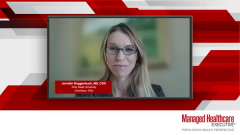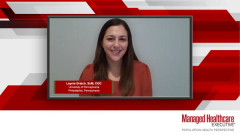
Considerations for Payers in Improving Access to Genetic Testing
Payer considerations for providing access to genetic testing are explored by key opinion leaders.
Episodes in this series

Jennifer Roggenbuck, MS, LGC: The offer of genetic testing is indicated for any individual with ALS [amyotrophic lateral sclerosis]. Payers can improve patient access to testing by covering the cost of that testing. Genetic testing has come down in cost dramatically in the past 10 to 15 years. It’s a drop in the bucket compared with all these other costs that come into play for individuals with ALS. It’s a very small cost, and that’s likely to decrease as our technology gets better. We’re moving toward being able to offer higher-quality testing at lower costs all the time. Genetic testing should be a fundamental part of ALS management. It should be covered by payers due to the many implications it has on patient management and the potential impact on family members, whether that’s for their own health or reproductive decision-making. It’s a small investment in very impactful knowledge that can assist individuals with ALS and their families.
Laynie Dratch, ScM, CGC: There are several ways payers can help ensure that all individuals with ALS have access to genetic counseling and testing. The first is to support the role of a genetic counselor in the clinic. Some ALS clinics are fortunate to have a genetic counselor dedicated to the clinic, where any individual who has ALS and is interested in discussing genetic testing has the ability to see a genetic counselor. Many clinics, especially those in more rural areas, don’t have a genetic counselor. We need to support the ability of neurologists to have a genetic counselor on the care team, because it’s too much to ask the neurologist to handle all the components of genetic counseling and testing care. In some situations, a neurologist will be able to handle these conversations. But not all neurologists will have the preparation, time, or resources to stay on top of this dynamic part of the field. That’s why a genetic counselor can be a wonderful asset to the team. It can be somebody embedded in the clinic or outsourced to a genetic counseling company, like those that have telehealth options for every state in the United States. Payers can help increase access to genetic testing by allowing genetic counseling to be part of the care team.
Payers can also partner with genetic counselors to help develop educational materials for neurologists and other providers to better understand the importance of genetic testing, so that they’re initiating these conversations and empowering patients to ask questions and to advocate for themselves to have this testing. We can help empower neurologists to initiate this process for individuals diagnosed. If an individual is considering predictive genetic counseling and testing—an individual who doesn’t have symptoms but is looking to see if they’re at risk—a genetic counselor should absolutely be involved. But when an individual is diagnosed, a neurologist might be able to handle the genetic testing process. We can increase access to genetic counselors, empower and educate the patients about the options of genetic testing, and empower neurologists to be involved in diagnostic testing and initiating these conversations early and often.
The cost of genetic testing is also something that payers can assist with. Sometimes there are sponsored no-cost genetic testing programs available that can increase patient ability to get this testing because genetic testing will be cost prohibitive. We just talked about how expensive ALS care can be. To add another couple of hundred dollars for genetic testing might not be feasible for some individuals. Luckily, the cost of genetic testing has dramatically decreased over time, but it’s still a cost. Sometimes these sponsored no-cost genetic testing programs can do wonders for increasing access to testing.
Another thing payers can assist with is doing things to address the shortage of genetic counselors throughout the country and throughout specialties. Genetic counselors are a finite and limited resource. We’re a growing field, but there’s a higher demand for us than the number of us coming into the field. Across the genetic counseling profession, across subspecialties, there has been a focus on alternative service-delivery models. We need to think creatively about how we can do this in ALS care. That could be developing video education to supplement genetic counseling, so that appointments are a little condensed because some of the education has already been handled. It could be group sessions or recorded webinars for some of the education. There may be ways we can leverage telehealth and other resources to streamline this process for individuals diagnosed with ALS. We need to think creatively, in terms of not just what we’re doing within the care team but also who is involved. Is it the genetic counselor? Is it the neurologist? When we’re thinking from the genetic counselor’s perspective, how can we make the most of this limited resource? How can we make sure that genetic counselors are practicing at the top of their scope? How can we delegate some tasks that might not require a genetic counselor to others on the care team or through alternative service-delivery models?
Transcript edited for clarity.
Newsletter
Get the latest industry news, event updates, and more from Managed healthcare Executive.






















